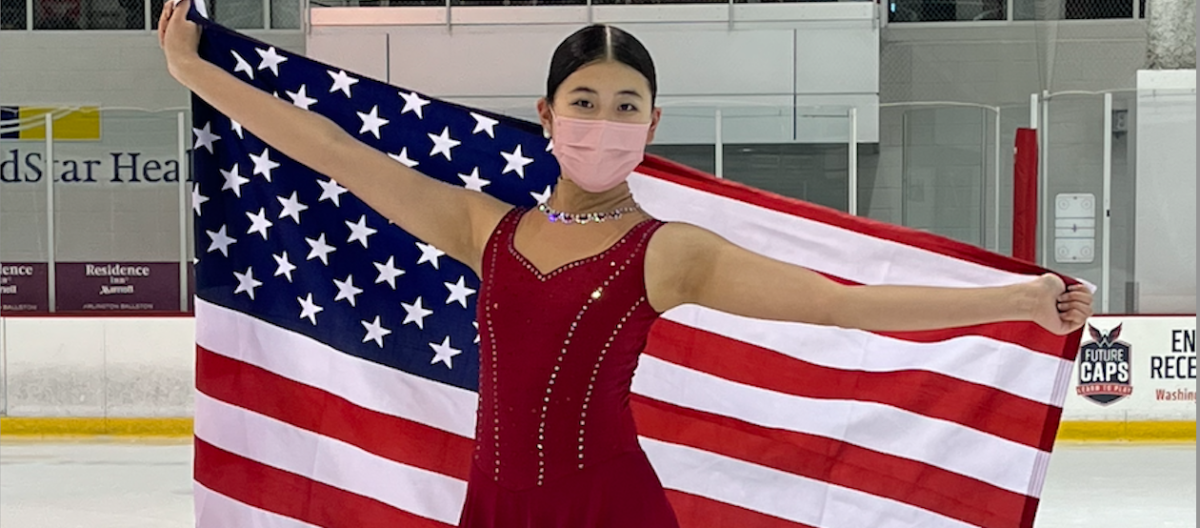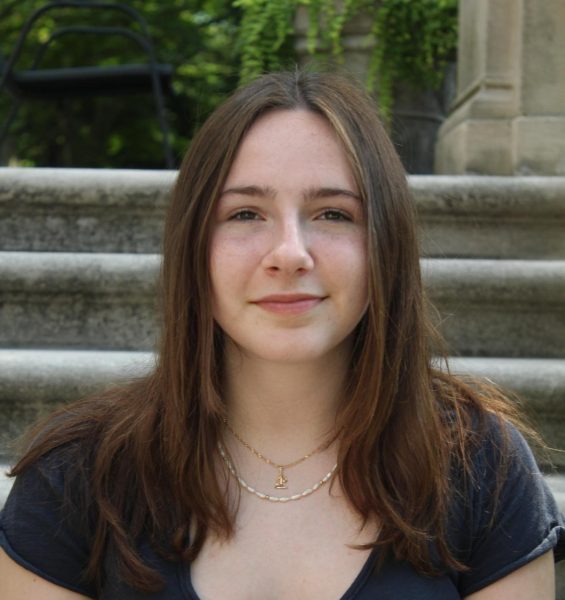IB students often struggle with how little time they have to do homework on top of their extracurriculars. Now, imagine having to do your homework in addition to dedicating over 27 hours per week to one extracurricular activity… This is junior Karin Kaneda’s reality.
Kaneda has been ice skating for about 12 years. When she was a young child, her parents put her in almost every single extracurricular available in the area, hoping that she would enjoy one. “Skating stuck because I was probably the best at it,” Kaneda said.
In fifth grade, Kaneda specialized in synchronized skating during the November to March season, in addition to solo dance during the March to September season.

Synchronized skating was formed in 1956 and is a relatively small sport with about 600 registered synchronized teams in the United States. In synchronized skating, teams of eight to 20 skaters across 18 levels perform challenging formations and step sequences together.
Kaneda is currently in her third year at the Junior level, the second-highest non-adult level. Her skating program, DC EDGE, the largest synchronized skating program in the DC metro area, does not offer the highest non-adult level, the Senior level, so she is working towards improving at the Junior level.

Her team meets for skating practice 18 hours per week and off-rink training for over four hours per week. Off-rink practice includes ballet, ballroom dance, pilates, and conditioning at the gym through weight lifting and cardio.
“It’s really hard to find times where, one, the rink is open and two, everyone can come so [practice is] either late at night, or very early in the morning,” Kaneda said.
Kaneda also skates individually for at least three hours each week, up to 15 hours per week before major competitions, and does around two hours of off-rink practice per week on her own.
At the level that Kaneda is at, skating is a family commitment and her parents invest a lot of money and time into it.
Nevertheless, Kaneda’s parents are supportive of her skating. “They’re definitely happy that I’m doing synchronized skating because it gives you a lot of aspects that you can grow, such as teamwork and leadership,” she said.
Kaneda notes that the team dynamics depend on the year and the people on the team. “This year, some people like being in a leadership position, some people follow,” she said. “Some people are less friendly with each other, but we’re still able to work together and practice.”
Kaneda has mostly had the same coaches for the past five years and feels that they put a lot of pressure on the team. “A lot of the people on our team do not like how they deal with us, and how sometimes it’s inhumane,” she said. “[But] at the end of the day, we are getting what we need to do done.”
One of Kaneda’s accomplishments is being selected for Team USA for the past two seasons. Every season she competes with her team at seven national competitions and one international competition.

Her team travels together a few days before the competition to adjust to the climate and the time zone. After they participate in official practices, they skate in the competition in an order that is decided by a lottery.
Kaneda feels a lot of pressure as individual mistakes are counted as the team’s mistakes. “15 other people’s goals, and all this time and effort they put into it, is on you,” she said.
However, once she starts skating she gets adrenaline and enjoys herself. “It’s fun just looking at the faces of the crowd and the judges and seeing how they react to your skating,” she said.
Ultimately, competitions are Kaneda’s favorite aspect of skating. “After a good skate or accomplishing something, being able to be happy about it with your teammates and knowing that you put in effort to achieve the goal that’s not just your own, but other people’s too [is rewarding],” she said.
One of Kaneda’s favorite skates was in 2015 when her team got a national bronze medal for the first time. “It’s the first time I remember seeing all of our coaches cry,” she said.

Kaneda’s other favorite was her team’s best skate at the 2022 TISSOT Neuchâtel Trophy in Neuchâtel, Switzerland. “That was like a really big feeling of accomplishment,” she said. “They’re cheering for just you, but they’re cheering for your team and your country, so then it feels like you’re really representing something bigger than yourself.”
Kaneda recognizes that she has had to sacrifice a lot, especially her time, to accomplish all that she has. “On the social aspect, it’s not that nice,” she said.
Nonetheless, she believes that her dedication to skating is worth it. “At the end of the day, getting Team USA and being able to compete internationally, I’d say it’s worth it in the long run,” she said. “But then it’s also trying to convince yourself that it is.”
To follow Karin Kaneda’s skating journey, follow her team @dcedgejuniorusa on Instagram.
By Zoe Hällström



































































